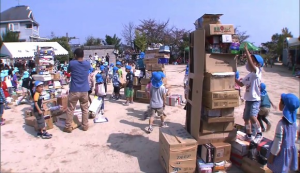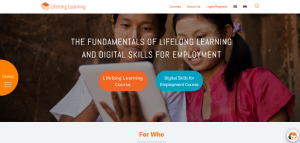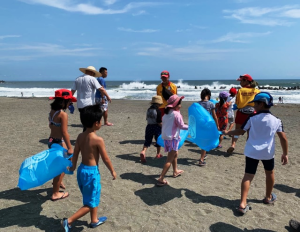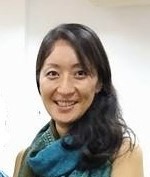Background of UNESCO and the Asia and Pacific Regional Bureau for Education (UNESCO Bangkok)
Although many people associate the name with its World Heritage sites, UNESCO works in five fields of concentration, namely ‘Education’, ‘Natural Sciences’, ‘Social and Human Sciences’, ‘Communication and Information’, and ‘Culture’ — only the latter directly responsible for the World Heritage programme. In regard to education, UNESCO has been serving as a lead agency to coordinate Goal 4 of the Sustainable Development Goals (SDGs), the United Nations goals for 2030: ‘Ensure inclusive and equitable quality education and promote lifelong learning opportunities for all’ [1] . The UNESCO Asia and Pacific Regional Bureau for Education (UNESCO Bangkok), where I work, covering46 Member States and regions, from Iran in the west to the Cook Islands in the east, and implements various education-related projects in and among the countries in the region toward the achievement of SDG4.
UNESCO was established in late 1945 as a direct response to the international community’s reflection on World War II. The intercultural suspicion and distrust caused by ignorance of each other’s customs and lives, the prevalence of racism due to ignorance and prejudice, and the general lack of respect for one another were taken into consideration, and it was argued that intellectual and emotional solidarity among humankind was essential to prevent the deterioration of peace in the future. In view of this humanitarian imperative, the Preamble to the UNESCO Constitution declares that ‘Since wars begin in the minds of people, it is in the minds of people that the defenses of peace must be constructed’.
Japanese Funds-in-Trust (JFIT) for the Promotion of Education in Asia and the Pacific Region

After World War II, and within six years of UNESCO’s founding, Japan became a Member States in 1951. This was the first step taken by Japan toward rejoining the international community (Japan would subsequently join the United Nations itself, UNESCO’s parent agency, in 1956). Since the 1970s, Japan’s Ministry of Education, Culture, Sports, Science and Technology (MEXT) has been supporting various education projects implemented by UNESCO Bangkok in the Asia-Pacific region through the Japanese Funds-in-Trust (JFIT). Foremost among these is the support given to UNESCO Bangkok to serve as a secretariat for the implementation and coordination in the Asia-Pacific Region of the global international educational cooperation initiatives, from the Education for All (EFA) initiative in the 1990s to the current SDG4; support is also provided UNESCO Bangkok to host regional meetings in connection to these initiatives. Thanks to current support from JFIT, we are organizing a series of Asia-Pacific Meeting on Education2030 (APMED2030), which is held once annually to share among attendees recent SDG4 progress and ongoing monitoring of SDG4, and to carry out capacity building training and knowledge management, among other programs [2].
I would like to outline here several additional educational projects implemented with support provided by JFIT:
(1) Innovative Pedagogical Approaches in Early Childhood Care and Education (ECCE)

This Project was implemented with the objective to improve the equity and quality of ECCE in countries in the Asia-Pacific region, and to provide ECCE teachers and stakeholders with access to effective and innovative tools. Through expert meetings and activities, resource books and videos have been produced that compile nine exemplary and innovative pedagogical practices. One of the case studies is Kaede Kindergarten in Hiroshima, Japan , which demonstrates how various learner competencies (i.e. qualities) are nurtured, including teamwork, creativity, problem-solving, and sympathy by respecting children’s independence and autonomy, and allowing them to learn through play. In addition, this example highly praised teachers’ willingness to undergo continuous trial and error and reflect on their own position and role in supporting children’s holistic growth.
(2) Online Course on Community Learning Centers (CLC) and Lifelong Learning

UNESCO Bangkok has been conducting CLC-related activities with support from JFIT since 1998. In particular, there is much to learn from the structure and role of Japan’s Community Learning Centers, or ‘Kominkan’. Regarding increased interest and quality improvement of non-formal education and lifelong learning, Japan’s knowledge and experience has been shared as one of the possible models. In order to continue to make effective use of the handbooks, lifelong learning expert training materials, and reports that have been produced in various projects by UNESCO and partner organizations over the last 20 years, this project has reviewed them in detail with a team of experts, and their findings have been compiled into an online course of 11 short video modules. These videos can be viewed with subtitles in seven different languages, including English, and they have been used by a wide range of educators, including government Ministries of Education, CLC facilitators, and NGOs/Civil Society Organizations (CSOs). One of the noteworthy achievements of the CLC project is that CLCs, which began as pilot projects in various countries with long-term support from Japan, have now been integrated in the central education policies and plans of countries such as Viet Nam and Laos, where they are being expanded nationwide.
(3) Promoting Community-Based Education for Sustainable Development (ESD) in the Asia and Pacific Region

In order to promote ESD [3] at both policy and community levels, this project was implemented with participation from five Asian countries, including Japan, to strengthen the capacity of community-supported educators to enable high-quality learning applied to identifying and solving problems in their communities from the perspective of sustainability. The project aimed to strengthen the capacity of education officials that support their communities. Together with an expert team, a three-stage framework of reflect-share-act was developed, and participants from each country followed this framework to reflect on the activities of their organizations and communities in their respective countries and look for areas for improvement that fit their local contexts [4]. From Japan, Hiratsuka City Kominkan participated in the workshop and incorporated ESD perspectives into their daily community center activities, such as the summer beach cleanup and recycling activities at the summer camp. It is hoped that by rethinking and reviewing various activities and events conducted individually in the context of ESD and sustainability, explicit understanding and behavioral changes will be promoted.
Since the United Nations Decade of Education for Sustainable Development began in 2005, UNESCO has been promoting ESD with strong support from Japan, while innovative initiatives are being implemented by various actors in Japan, such as the UNESCO Associated Schools Network (ASPnet) [5] and local governments. Rooted in Target 4.7 and contributing to the achievement of all 17 SDGs, ESD is recognized as the foundation for the transformation needed to equip people with the knowledge, skills, values and attitudes to become agents of change towards sustainable development.
Conclusion
Given the current COVID-19 pandemic, many of us have been vividly reminded of the interconnectedness and interdependence of the world. In addition to addressing the impact on health and the economy, we need to continue to tackle many issues in education, such as the closure of schools and learning facilities, and the loss of learning opportunities due to the digital divide, all currently threatening the achievement of SDG4. According to the UNESCO Institute for Statistics, as of April 2020, 3.1 million schools and education facilities across the region, 850 million students and pupils, and 43 million teachers have been negatively affected[6]. On the other hand, there seems to be some hope to glean from this difficult situation, such as the rapid progress of Information and Communications Technology (ICT)-based learning. The use of social media and online conferencing/conversation tools, as well as other adaptive measures, are enabling us to interact more than ever before across regions and countries, and to dialogue among a diverse range of stakeholders. If each and every one of us shares our knowledge and experiences, and learns from one another, a great step might be made towards building a peaceful and sustainable society where ‘no one left behind’ as advocated by the SDGs, will become a reality.
__________________
■Profile

Sayaka Tsutsui
Japanese Funds-in-Trust (JFIT) Programme Coordinator, UNESCO Asia and Pacific Regional Bureau for Education (UNESCO Bangkok).
Specialised in International Education Development, Literacy, Non-Formal Education, and ESD/GCED. Formerly at Japan International Cooperation Agency (JICA) Iran Office; the Embassy of Japan, Uganda; Asia-Pacific Cultural Centre for UNESCO (ACCU), Japan, and others.
[1] Japan SDGs Action Platform : https://www.mofa.go.jp/mofaj/gaiko/oda/sdgs/statistics/goal4.html
[2] Asia-Pacific SDG4-Education2030 Knowledge Portal : https://apa.sdg4education2030.org/
[3] ESD comprises learning and educational activities that aim to develop alternative values and transformative actions that lead to problem-solving and to realize a sustainable society by taking the initiative to accept problems of modern society, such as climate change and the expansion of poverty, as our own and tackling the problems in our immediate environment (think globally, act locally) in order to ensure that human beings are able to secure an abundant life for future generations. https://www.mext.go.jp/unesco/004/1339970.htm
[4] Promoting Community-based Education for Sustainable Development : https://bangkok.unesco.org/content/promoting-community-based-education-sustainable-development
[5] UNESCO Associated Schools Network : https://www.unesco-school.mext.go.jp/
[6] School Closures and Regional Policies to Mitigate Learning Loss due to COVID-19: A Focus on the Asia-Pacific : http://uis.unesco.org/sites/default/files/documents/school_closures_and_regional_policies_to_mitigate_learning_losses_in_asia_pacific.pdf







